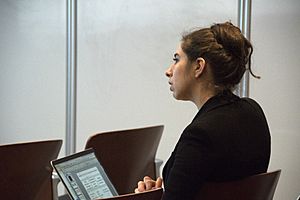Sarah Garfinkel facts for kids
Quick facts for kids
Sarah Garfinkel
|
|
|---|---|
 |
|
| Nationality | British |
| Citizenship | United Kingdom |
| Alma mater | University of Sussex |
| Scientific career | |
| Fields | Neuroscience, Psychiatry |
| Institutions | University of Sussex Brighton and Sussex Medical School |
| Thesis | Modulating false and veridical memory : the effects of repetition and alcohol at encoding (2006) |
Sarah Garfinkel is a British brain scientist and professor. She works at the University of Sussex and the Brighton and Sussex Medical School. Her research looks at how our bodies sense themselves (called interoception) and how this links to our feelings and memories. In 2018, she was named one of the top rising stars in science.
Her Journey in Science
Sarah Garfinkel was born in London. She earned her PhD in psychology from the University of Sussex in 2006. Her studies focused on how memory works.
After her PhD, she worked at the University of Michigan. There, she studied how memory works in veterans who had posttraumatic stress disorder (PTSD). PTSD can happen after a very scary event. In 2011, she joined the Brighton and Sussex Medical School. Today, she leads her own research team there.
What She Researches
Professor Garfinkel's main research area is interoception. This is our ability to feel what's happening inside our own bodies. For example, it's how we know our heart is beating or if we feel hungry. She especially studies the heartbeat and how people sense it.
Her work has shown that how we feel our heartbeat can change how we deal with fear. She has also found that people with autism sometimes find it hard to sense their own heartbeat. This can make them feel worried or stressed.
Because of this research, a new type of help called interoception-directed therapy was created. This therapy aims to help autistic people feel less anxious by helping them understand their body's signals better.
Sharing Her Work
Sarah Garfinkel enjoys sharing her science with others. She has been a guest on radio and TV shows. These include 'All in the Mind' and 'The Shock'.
In 2017, she gave a talk at TEDxBrighton. In 2018, the BBC featured her in a short film. In the film, she talked about her exciting research on interoception and autism.

